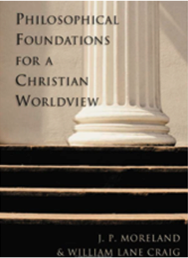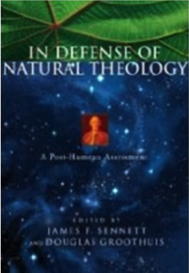Academic Connections, International
aconnectionsi@gmail.com © Academic Connections, International
Natural Theology
In this section we wish to provide resources for you to review promising leads to latter day natural theology arguments. That is because in recent times some of the classical arguments have undergone refinement and improvement. If you haven’t, be sure to read the introductory remarks on the page that brought you here, before going on.
An important philosophical question to ask is whether the success of these arguments is necessary in order to hold theistic belief rationally; that is, more formally, do these arguments need to be sound arguments because they are the only means to establish the rationality of holding theistic beliefs?
For instance, Plantinga (see his “Two Dozen or More Theistic Arguments” below) does not think so even though he provides quite a number of arguments. Of course, if these arguments were sound--in the strongest sense of sound argument, which would be to be based universally accepted self-evident premises--it would certainly help things. It should be pointed that there are weaker senses of sound arguments. In those senses the premises of the argument are thought to be more probable or plausible than their denials. Then for those who hold that those premises are more probable or plausible than their denial (assuming the form of the argument is valid), the argument is (person relative) sound. That is to say the argument is cogent for that person.
Many here, however, do think it is necessary to have some sort of sound arguments (stronger or weaker) in order for theistic belief to be rational. To make sure you understand why Plantinga doesn’t think they’re necessary, check the other option, “Non-inferential” option, which is up a level. Cheers!
On-line resources
Introduction
• Check this Oxford professor’s brief assessment (Vince Vitale): “God is Not Dead”
• Bill Craig’s website resources on natural theology: Article Page for “Existence of God”
• Alvin Plantinga: Two Dozen or More Theistic Arguments
• Is Atheism Irrational? (Interview with Alvin Plantinga in NYT
• Richard Swinburne: Arguments for (about) God
• Dallas Willard: Language, Being, God and Three Stages of Theistic Evidence
• Owen Gingerich: Is There a Role for Natural Theology Today?
• Theopedia: Natural Theology (definition)
• Internet Encyclopedia of Philosophy: Natural Theology (definition and more)
*******
A Posteriori Arguments
Cosmological Argument Forms
Bill Craig’s Version of Kalam Cosmological Argument
Feser’s Take on the Cosmological Argument
Teleological Argument Forms
Bill Craig on the Anthropic Principle
New Argument for Fine Tuning (Jason Waller)
Richard Swinburne’s Version of Teleological Argument
Moral Arguments Forms
A Priori Arguments
Ontological Argument Forms
Anselm
Plantinga
Also, be sure to check out the “Advanced Problems” (section 5), which has more resources and takes a deeper look at natural theology.
Annotated Readings in Natural Theology
Moreland, J.P. & Craig, William Lane. Philosophical Foundations for a Christian World View. Downer’s Grove: Ill: InterVarsity Press, 2003.
For a useful discussion and a good place to start your readings, see pps 463-500. An important thing to see is that arguments are typically analyzed in terms of their validity, that is their form, and their soundness. The latter issue has to do with whether the premises are true are not. Now another way to think about the soundness of arguments is to think about whether those premises are more probable or plausible than their denials. Craig, especially, argues this way and that’s important to see because plausibility issues can depend on one’s world view, which is to say that arguments of this sort can be person relative.
Sennet, James F. and Groothuis, Douglas (Editors). In Defense of Natural Theology: A Post Humean Assessment. Downers Grove, Ill: InterVarsity Press, 2005.
Here’s a synopsis of the book from the Barnes and Noble site:
Synopsis
"The shadow of David Hume, the eighteenth century Scottish philosopher, has loomed large against all efforts to prove the existence of God from evidence in the natural world. Indeed from Hume's day to ours, the vast majority of philosophical attacks against the rationality of theism have borne an unmistakable Humean aroma. The last forty years, however, have been marked by a resurgence in Christian theism among philosophers, and the time has come for a thorough reassessment of the case for natural theology." James F. Sennet and Douglas Groothuis have assembled a distinguished team of philosophers to engage the task. Together this team makes vigorous individual and cumulative arguments that set Hume's attacks in fresh perspective and that offer new insights into the value of teleological, cosmological, ontological, experiential, moral, rational and cumulative case arguments for God's existence.

